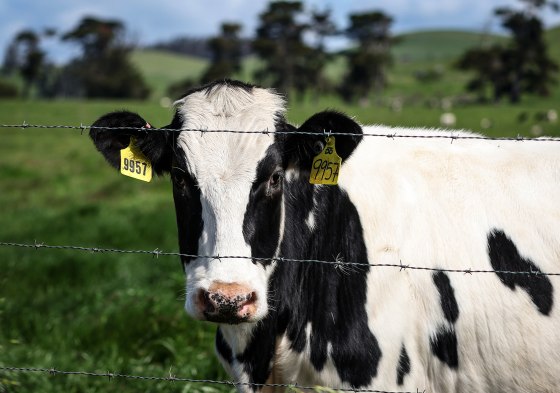
The U.S. Department of Agriculture published a federal order Friday requiring the testing of the nation’s milk supply for avian flu.
Samples must be gathered and shared with USDA upon request by organizations that handle raw milk, such as dairy processors or bulk milk transporters.
The objective is to stop the spread of the avian flu strain H5N1, which is generating outbreaks in poultry and dairy cows, among livestock by promptly identifying which dairy herds are impacted. In 15 states, 718 dairy cattle were impacted as of Thursday.
Among other benefits, this will help farmers and farmworkers feel more secure about their animals’ safety and self-defense, and it will set us up for swiftly containing and halting the virus’s spread across the country, Agriculture Secretary Tom Vilsacks stated in a press release on Friday.
First reported by Reuters, the order’s first round of testing is scheduled to start on December 16. Six states—California, Colorado, Michigan, Mississippi, Oregon, and Pennsylvania—will be included in the initial launch.
The directive requires dairy herd owners who have cattle that test positive for bird flu to disclose information that can aid in surveillance, in addition to the testing requirement.
In April, the USDA previously issued a federal directive requiring state veterinarians and commercial labs to disclose positive cases of avian flu in lactating dairy cows that were tested for the disease before being moved across state lines. The new order also keeps those criteria in place.
The Centers for Disease Control and Prevention advise against consuming untreated or raw milk as it has not been pasteurized, which eliminates bacteria.Commercial pasteurization, which uses heat to treat milk, inactivates the virus and renders the milk safe for human consumption, according to several studies.
Although up to 30 states permit local sales of raw milk, the Food and Drug Administration also supervises sales across state lines.
Health inspectors in California discovered avian flu in several batches of raw milk from a nearby dairy farm in November. Although no human avian flu cases have been connected to the farm’s raw milk or cream, the California Department of Public Health announced a widespread recall of the goods on store shelves on Tuesday.
In the United States, 58 human cases of avian flu have been identified to date. Most of them had come into contact with contaminated poultry or livestock. So far, the symptoms have been moderate and frequently include sneezes, coughing, and pinkeye. The CDC advises everyone who has been exposed to bird flu to get tested, though, as some instances may be asymptomatic, according to a report released last month.
Studies conducted on dairy farms have demonstrated that the virus effectively transmits from cows to other creatures, including cats and raccoons. Because sick cows release a lot of the virus through their mammary glands, scientists believe that the virus most likely travels between farm animals through raw milk.
Although there is currently no proof that humans can spread bird flu to one another, experts are worried that H5N1 may develop in that way, which might result in the next global health crisis.
Those worries were reinforced by research released on Thursday in the journal Science. According to the study, the avian flu strain that is circulating in dairy cows would spread more readily between humans if it underwent a single mutation.
Note: Every piece of content is rigorously reviewed by our team of experienced writers and editors to ensure its accuracy. Our writers use credible sources and adhere to strict fact-checking protocols to verify all claims and data before publication. If an error is identified, we promptly correct it and strive for transparency in all updates, feel free to reach out to us via email. We appreciate your trust and support!
